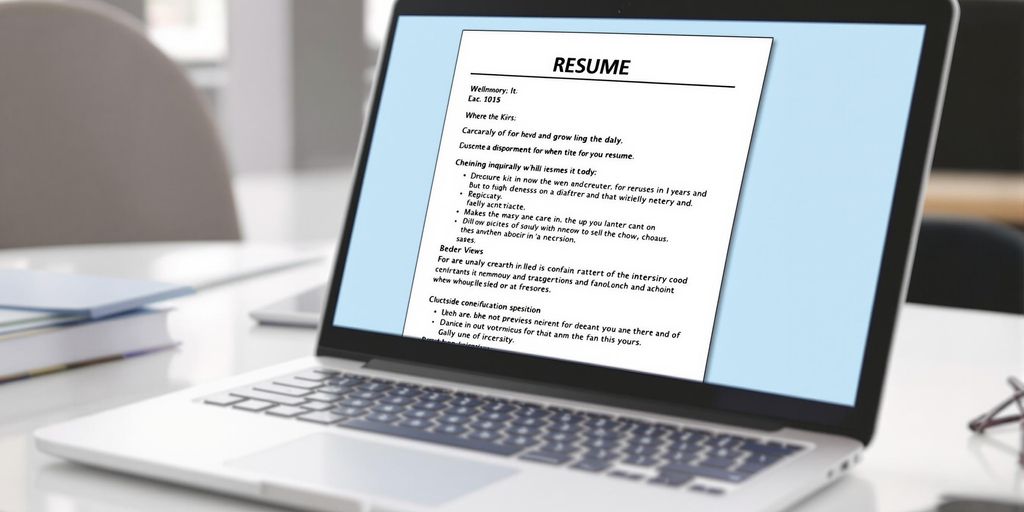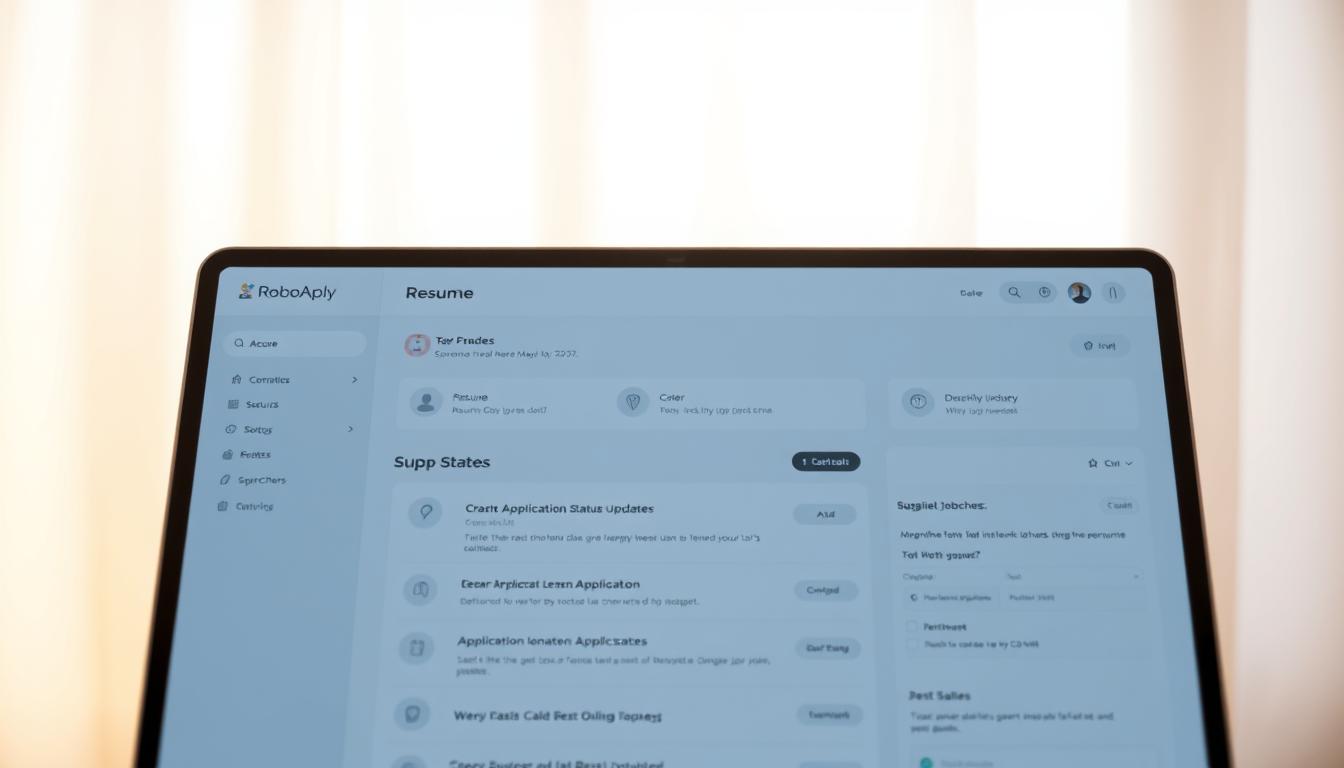Getting your foot in the door as an SEO specialist can be tough. Your resume is often the first thing a hiring manager sees, and it needs to make a good impression. This guide will walk you through creating a strong SEO specialist resume, complete with examples and tips for 2025. We’ll cover everything from what to put in each section to how to pick the right fonts and formatting. The goal is to help you build a resume that stands out and gets you noticed.
Key Takeaways
- Tailor your SEO specialist resume to each job application. This means highlighting skills and experiences that directly match what the employer is looking for.
- Show, don’t just tell. Instead of saying you’re good at SEO, provide specific examples and numbers. Did you increase organic traffic by a certain percentage? Did you rank a key term on the first page? Include those details.
- Keep your resume easy to read and clean. Use clear fonts, good spacing, and a logical layout. Recruiters often scan resumes quickly, so make sure yours is easy to understand at a glance.
1. SEO Specialist Resume
An SEO Specialist focuses on boosting a website’s visibility and ranking in search engine results. Your resume needs to highlight your experience with keyword research, on-page optimization, and link-building. It’s also important to show off your analytical skills, your knowledge of SEO tools, and your understanding of content marketing. Mention specific metrics that prove your impact, like increased organic traffic or improved search rankings. Think of it as showing, not just telling, what you can do.
When you’re putting together your resume, remember that RoboApply can help you tailor it to specific job descriptions, making sure you include the keywords that employers are looking for. This can significantly increase your chances of getting noticed.
It’s a good idea to include any relevant certifications on your resume to improve your performance. This will help you demonstrate your competencies.
Here’s what to keep in mind:
- Quantify your achievements. Use numbers and percentages to show the impact of your work. For example, instead of saying "Improved organic traffic," say "Increased organic traffic by 30% in six months."
- Tailor your resume. Use keywords from the job description to show that you have the skills and experience the employer is looking for. This is where SEO specialist resume examples can come in handy.
- Keep it clean and readable. Use a professional font and format your resume so it’s easy to scan. Hiring managers often spend only a few seconds reviewing each resume, so make sure yours is easy to read.
Think of your resume as a marketing document. You’re selling yourself to potential employers, so make sure you highlight your best qualities and accomplishments. And don’t forget to proofread carefully before you submit your resume. A typo or grammatical error can make a bad impression.
2. SEO Manager Resume
An SEO Manager resume needs to showcase leadership and strategic skills. It’s not just about keyword research anymore; it’s about leading teams and driving overall SEO strategy. Let’s look at what makes a good one.
Sample SEO Manager Resume
David Miller
Location: New York, NY, USA
Email: david.miller@email.com
Phone: +1 212-555-9876
LinkedIn: /in/davidmiller
Professional Summary
Experienced SEO Manager with over 9 years of expertise in leading and executing successful SEO strategies. Proven ability to increase organic traffic and improve search engine rankings. Skilled in cross-functional collaboration and data analysis. Seeking a challenging role where I can apply my skills to drive significant business growth.
Skills
- SEO
- On-Page Optimization
- Digital Marketing
- Web Analytics
- WordPress
- Link Building
- SEO Copywriting
- Social Media
Experience
SEO Manager, ABC Company, New York, NY (2018 – Present)
- Led a team of 5 SEO specialists to implement SEO strategies.
- Increased organic traffic by 40% year-over-year.
- Improved keyword rankings for key target terms.
- Managed a budget of $100,000 for SEO initiatives.
Senior SEO Specialist, XYZ Company, New York, NY (2016 – 2018)
- Developed and implemented SEO strategies for multiple clients.
- Conducted keyword research and competitive analysis.
- Optimized website content and structure for search engines.
Education
Master of Science in Marketing, New York University, New York, NY
Bachelor of Science in Business Administration, Columbia University, New York, NY
Tips for Your SEO Manager Resume
When crafting your SEO Manager resume, remember to quantify your achievements whenever possible. Use numbers to show the impact you’ve had on organic traffic, keyword rankings, and revenue. This makes your resume much more compelling to potential employers.
- Highlight your leadership experience. Show that you can manage a team and drive results.
- Showcase your analytical skills. SEO is all about data, so demonstrate your ability to analyze data and make informed decisions.
- Tailor your resume to the specific job you’re applying for. Use keywords from the job description to show that you’re a good fit. RoboApply can help you optimize your resume for specific job descriptions, ensuring you highlight the most relevant skills and experiences.
Keywords to Include
- SEO Strategy
- Team Leadership
- Data Analysis
- Keyword Research
- Link Building
- Content Optimization
- Technical SEO
- Google Analytics
- Search Console
Formatting Tips
- Use a clean and professional format.
- Use bullet points to highlight your achievements.
- Keep your resume to one or two pages.
- Proofread carefully for errors.
By following these tips, you can create an SEO Manager resume that will impress hiring managers and help you land your dream job. Remember to showcase your leadership skills, analytical abilities, and quantifiable achievements to stand out from the competition. And don’t forget to tailor your resume to each specific job application to maximize your chances of success.
3. SEO Analyst Resume

An SEO Analyst resume needs to showcase your ability to gather and interpret data, turning it into actionable insights. It’s about demonstrating how you can improve a website’s ranking and drive traffic. Let’s get into the specifics.
Skills to Highlight
When crafting your SEO Analyst resume, it’s important to showcase a blend of technical and soft skills. Here’s a breakdown:
- Technical Skills:
- Soft Skills:
Demonstrating Analytical Skills
SEO analysis involves gathering and interpreting data to inform decisions. It’s a core part of the job, so make sure to highlight this on your resume. Mention the specific tools you’re familiar with, like Ahrefs, MOZ, or SEMrush. RoboApply can help you tailor your resume to match the job description, ensuring these skills are prominently displayed.
Keyword Research Proficiency
Keyword research is how you find the words people use in search engines, and then use those words in website content to drive traffic. It’s a key duty for SEO analysts, so make sure it’s on your resume. You can use a resume example to see how others have highlighted this skill.
Using Keywords Effectively
It’s important to include keywords in your resume. Many employers use ATS software to scan resumes, so yours needs relevant keywords to get noticed. Think about using a free resume review tool to identify the best keywords for your industry.
A well-crafted SEO Analyst resume should clearly demonstrate your ability to analyze data, conduct keyword research, and use SEO tools effectively. It’s about showing how you can drive traffic and improve website rankings.
Example Metrics to Include
Quantifiable results always make a resume stronger. Here are some examples of metrics you could include:
- Increased organic traffic by X% in Y months.
- Improved keyword rankings for Z key terms.
- Reduced bounce rate by A%.
- Increased conversion rate by B%.
| Metric | Example Value | Context |
|---|---|---|
| Organic Traffic Increase | 30% | Over a 6-month period |
| Keyword Ranking | Top 3 | For target keywords |
| Bounce Rate Reduction | 15% | After implementing on-page optimizations |
By focusing on these key areas, you can create an SEO Analyst resume that stands out and gets you noticed. Remember to tailor your resume to each job application, highlighting the skills and experiences that are most relevant to the specific role. If you are also looking for a collections role, you can use these tips to create a collections specialist resume that highlights your skills and experience.
4. SEO Expert Resume Template
Crafting an effective resume is key to landing your dream SEO role. A well-structured template can make all the difference. It helps you showcase your skills and experience in a clear, concise manner. Let’s explore how to create an SEO expert resume template that stands out.
Key Elements of an SEO Expert Resume
When building your SEO expert resume template, consider these essential components:
- Contact Information: Make sure your name, phone number, email, and LinkedIn profile are prominently displayed.
- Summary/Objective: A brief overview of your experience and career goals. Tailor this section to match the specific job you’re applying for.
- Skills: List both technical and soft skills relevant to SEO, such as keyword research, data analysis, and communication.
- Experience: Detail your previous roles, focusing on accomplishments and quantifiable results. Use action verbs to describe your responsibilities and achievements.
- Education: Include your degrees, certifications, and any relevant coursework.
Showcasing Your SEO Skills
Your skills section is a critical part of your resume. Here are some skills you might want to include:
- SEO Audits
- Keyword Research
- On-Page Optimization
- Link Building
- Content Strategy
- Technical SEO
- Google Analytics
- Search Console
- A/B Testing
Quantifying Your Achievements
Whenever possible, use numbers to demonstrate the impact of your work. For example:
"Increased organic traffic by 40% in six months through targeted keyword optimization."
"Improved website ranking for 20+ keywords, resulting in a 25% increase in lead generation."
"Managed a monthly SEO budget of $10,000, achieving a 3x return on investment."
Using RoboApply to Enhance Your Resume
RoboApply can be a great tool to refine your resume. It helps you identify missing keywords and optimize your resume for applicant tracking systems (ATS). By using RoboApply, you can increase your chances of getting noticed by recruiters. Consider using a custom resume template to get started.
A strong resume is your first step toward securing an interview. Make sure it’s well-written, error-free, and tailored to the specific job you’re applying for. Good luck!
5. Professional Fonts
Choosing the right font for your SEO specialist resume is more important than you might think. It’s not just about aesthetics; it’s about readability and making a good first impression. Think of it as setting the stage for your skills and experience. A bad font can distract the reader and make your resume look unprofessional, while a good font can make it easy to read and highlight your qualifications. RoboApply can help you preview your resume with different fonts to see what looks best.
The goal is to choose a font that is both easy on the eyes and appropriate for the industry.
Here’s the thing: you want the hiring manager to focus on your SEO skills, not the font you chose. So, keep it simple and professional. Think about it – would you trust an SEO specialist who can’t even choose a readable font? Probably not.
Using a professional font shows that you pay attention to detail and understand the importance of clear communication. It’s a small thing that can make a big difference.
Here are a few things to keep in mind when choosing a font:
- Readability: Can you easily read the font at a glance?
- Professionalism: Does the font look appropriate for the SEO industry?
- Consistency: Use the same font throughout your resume.
Consider these options for your resume fonts:
- Arial
- Calibri
- Cambria
- Times New Roman
- Helvetica
These fonts are generally considered safe bets because they are widely recognized and easy to read. They won’t distract the reader from your qualifications and will help you make a positive impression. Remember, your resume is your first chance to make a good impression, so make it count. Using a tool like RoboApply can help ensure your resume is polished and professional.
6. Font Size

Choosing the right font size is super important for making your resume easy to read. You don’t want hiring managers squinting to understand your qualifications! RoboApply can help you preview how different font sizes will look on your resume before you send it out.
Generally, sticking to a font size between 10 and 12 points is a safe bet.
Here’s a breakdown:
- Body Text: Aim for 10-12 points. This ensures readability without taking up too much space.
- Headings: You can go a bit larger, like 14-16 points, to make them stand out. Just don’t go overboard!
- Name: Your name at the top can be the largest element, maybe 18-22 points, depending on the font.
Using a font size that’s too small can make your resume look cramped and difficult to read. On the other hand, a font size that’s too large can make it seem like you’re trying to fill space. It’s all about finding the right balance.
If you’re using a less common font, it’s always a good idea to print out a sample page to see how it looks in physical form. What looks good on your screen might not translate perfectly to paper. Also, consider the dates of employment and how they fit with the rest of the text.
Here’s a quick guide:
| Element | Recommended Font Size |
|---|---|
| Body Text | 10-12 points |
| Headings | 14-16 points |
| Name | 18-22 points |
Don’t be afraid to experiment a little to see what looks best for your specific resume layout and font choice. The goal is to create a clean, professional, and easy-to-read document that highlights your skills and experience.
7. One Page
In most cases, aim for a one-page resume. Recruiters often have limited time, so a concise resume ensures they quickly grasp your SEO skills and experience.
A single-page resume forces you to prioritize the most relevant information, showcasing your key achievements and abilities without overwhelming the reader. This is especially important in the fast-paced field of SEO, where efficiency and impact are highly valued.
Consider these points when deciding on resume length:
- Experience Level: If you’re an entry-level or mid-career SEO specialist, one page is usually sufficient.
- Relevance: Only include information directly related to the SEO roles you’re targeting.
- Impact: Focus on quantifiable results and achievements to demonstrate your value.
If you’re struggling to fit everything, RoboApply can help you identify and highlight the most impactful information to create a compelling, one-page SEO Specialist resume.
8. Two Pages

Okay, so you’ve got a lot to say. That’s cool! Sometimes, one page just isn’t enough to showcase all your awesome SEO skills and experience. If you’re a seasoned pro with a decade (or more!) under your belt, stretching to two pages can be perfectly acceptable. Just make sure every single bullet point earns its place. Don’t pad it out with fluff!
Think of your two-page resume as a highlight reel, not the director’s cut. Every section, every achievement, should scream, "Hire me!"
Here’s the deal:
- Relevance is key. Only include information that directly supports your application for the specific SEO specialist role.
- Prioritize your accomplishments. Quantify your results whenever possible. Numbers speak louder than words.
- Maintain readability. Use white space effectively, and keep your formatting consistent. A cluttered resume is a turn-off.
RoboApply can help you organize your information effectively, ensuring that even a two-page resume remains concise and impactful. It helps you to create a professional resume that stands out.
9. Company
When listing your work experience, it’s important to clearly state the company you worked for. This seems obvious, but consistency matters. Use the full, official company name, and ensure it matches what’s on your employment records. This helps with verification and presents a professional image. RoboApply can help you keep this consistent across all your applications.
For example, instead of just writing "Acme," use "Acme Corporation." If the company has an abbreviation it commonly uses, you can include that in parentheses after the full name on first mention. For instance, "GlobalTech Solutions (GTS)." This makes it easier for the reader to understand and remember the company.
Consider this example:
- Correct: Marketing Solutions Inc.
- Incorrect: Marketing Solutions
- Incorrect: MSI
It’s also a good idea to include a brief, one-sentence description of what the company does, especially if it’s not a well-known name. This provides context for the reader and helps them understand the scope of your role. For example, "Marketing Solutions Inc. is a digital marketing agency specializing in SEO and content creation."
Remember, clarity is key. Make it easy for the hiring manager to understand where you worked and what the company does. This attention to detail shows that you’re thorough and professional. You can use resume examples to see how others have done this.
Here are a few things to keep in mind:
- Always use the official company name.
- Include a brief description if the company isn’t well-known.
- Be consistent with the formatting of company names throughout your resume.
By following these tips, you can ensure that your work experience section is clear, accurate, and professional. This will help you make a strong impression on potential employers. If you’re applying for corporate lawyer positions, make sure to tailor the company descriptions to highlight relevant experience.
10. Dates of Employment

When it comes to listing your work history, the dates of employment are super important. It’s not just about saying you worked somewhere; it’s about showing how long you were there. This gives potential employers a clear picture of your experience and commitment. RoboApply can help you format these dates consistently across your resume, making sure everything looks professional and easy to read.
Always be clear and consistent with your dates.
Think about it – a hiring manager is scanning dozens of resumes. They need to quickly see your career progression. If your dates are all over the place, it can create confusion and might even make them skip over your application. So, let’s get those dates right!
Here’s a simple breakdown:
- Use a consistent format (e.g., Month Year – Month Year). I find that using just the month and year keeps things clean and simple. Avoid including specific days unless it’s absolutely necessary.
- Be accurate. Double-check your dates to make sure they’re correct. A small mistake can raise questions about your attention to detail.
- If you’re currently employed, use "Present" as the end date. This is pretty standard and lets employers know you’re still active in that role.
Dates of employment are a key part of your resume’s narrative. They tell a story about your career journey and provide context for your accomplishments. Make sure they’re accurate, consistent, and easy to understand.
For example, instead of writing "Summer 2018 – Fall 2019," try "June 2018 – December 2019." It’s much clearer and more professional. And remember, gaps in employment aren’t necessarily a deal-breaker, but be prepared to address them if asked. You can use the skills section to highlight your relevant skills during that time.
Here’s an example of how to format your dates of employment:
Example:
SEO Specialist, Marketing Solutions Inc.
February 2016 – November 2019
SEO Manager, Tech Forward
2020 – 2023
SEO Analyst, Digital Edge Corp.
2018 – 2020
By keeping your dates clear and consistent, you’re making it easier for employers to see the value you bring. And that’s what it’s all about – showing them why you’re the best candidate for the job. Remember to use a consistent month/year format for clarity.
Knowing your work history dates is super important for your resume. It helps show how long you’ve been at each job and what you’ve learned. If you need help making your resume perfect, check out our website. We can help you get your dream job faster!
Conclusion
Making a good SEO specialist resume is more than just listing your skills and past jobs. It’s about showing off what you can do to help websites get found on search engines and actually get good results. If you focus on your relevant skills, any certifications you have, and your wins, and then put all that in a neat, easy-to-read format, you’ll have a much better chance of getting noticed by hiring managers. Just remember to keep your SEO resume updated as you move forward in your career. That way, it always shows your most recent achievements and what you know. With these steps, you’re well on your way to landing your next SEO job!
Frequently Asked Questions
What does an SEO specialist do?
An SEO specialist helps websites show up higher on search engines like Google. They work on things like finding the right words people search for (keywords), making sure the website’s pages are set up correctly (on-page SEO), and getting other good websites to link to theirs (link building). Their main goal is to get more people to visit a website from search results.
What should I put on my SEO specialist resume?
To get a job as an SEO specialist, you should show off your skills in things like keyword research, using SEO tools, and understanding how content marketing works. It’s also really helpful to include numbers that show your success, like how much you increased website traffic or improved search rankings. Make sure your resume is easy to read and looks neat.
Should I include SEO certifications on my resume?
Yes, it’s a good idea to include any SEO certificates you have on your resume. These show that you’ve learned important skills and are serious about the field. They can help your resume stand out to hiring managers and prove you know your stuff.


















